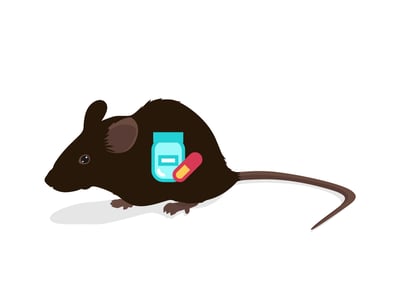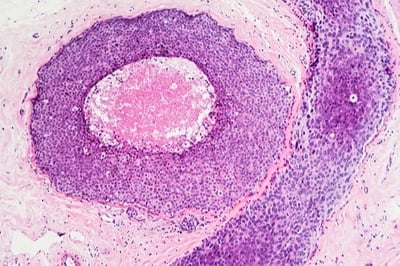FORCE's eXamining the Relevance of Articles for You (XRAY) program looks behind the headlines of cancer news to help you understand what the research means for you.
XRAY is a reliable source of hereditary cancer research-related news and information.
Learn more about the XRAY program
Categories Basic Science
Relevance: Medium-Low


Quality of Writing: Medium


Research Timeline: Animal Studies


Article : Promising drug for cancer treatment begins clinical trials
Relevance: Medium-Low


Quality of Writing: Medium


Research Timeline: Animal Studies


Most relevant for: People with solid tumors.
Researchers at City of Hope are testing a new type of cancer treatment drug. When tested in animals and cells taken from human cancers, this new drug prevented the growth of many types of cancer. Initial clinical trials in people have just started. (Posted 9/7/23)
Este artículo está disponible en español.
Read More
Relevance: Medium


Strength of Science: Medium


Research Timeline: Animal Studies


Study : Weight may affect breast cancer risk in women with an inherited BRCA mutation
Relevance: Medium


Strength of Science: Medium


Research Timeline: Animal Studies


Most relevant for: People with an inherited mutation in BRCA1 or BRCA2 concerned about their breast cancer risk
A study that looked at normal breast cells from women with an inherited BRCA mutation found more DNA damage among women who were overweight (based on a measurement known as body mass index) than those who were not overweight. The results suggest that maintaining a lower weight may reduce breast cancer among this high-risk population. (Posted 3/30/23)
Este artículo está disponible en español.
Read More
Update : FDA allows testing of a vaccine designed to prevent breast cancer
Most relevant for: Patients with non-metastatic triple-negative breast cancer at high risk of recurrence.
Scientists have been working for many years to develop a vaccine that will prevent breast cancer. The FDA recently announced that the first clinical trial to test a preventive breast cancer vaccine can begin. This vaccine is the result of over a decade of research in animals and human cells. While researchers will first test the vaccine in women who have breast cancer, they hope to use this vaccine in the future to prevent breast cancer. (posted 5/25/21)
THIS INFORMATION HAS BEEN UPDATED on 10/12/2021: The clinical trial discussed in this XRAY review has begun recruiting participants. Researchers hope to enroll 24 patients with non-metastatic triple-negative breast cancer. The trial is being conducted at the Cleveland Clinic in Cleveland, Ohio. More information on this trial can be found here.
Este artículo está disponible en español.
Read More
Relevance: Medium-Low


Strength of Science: Medium-High


Research Timeline: Animal Studies


Study : The buzz about honeybee venom: Promising early research to treat breast cancer
Relevance: Medium-Low


Strength of Science: Medium-High


Research Timeline: Animal Studies


Most relevant for: People with breast cancer particularly those with HER2-positive or triple-negative breast cancer.
Early research showed that melittin, an ingredient in honeybee venom, may be used to treat HER2-positive and triple-negative breast cancers. This study found that melittin can kill cancer cells. The chemotherapy drug docetaxel more effectively killed breast cancer cells in mice when combined with melittin. It is not known whether melittin would be safe or affect cancer growth in people. While promising, more research must be done before melittin could be used to treat people. (11/10/20)
Read More
Relevance: Medium


Strength of Science: Medium-High


Research Timeline: Human Research


Study : Metastasis is affected by wound healing and inflammation in study on mice
Relevance: Medium


Strength of Science: Medium-High


Research Timeline: Human Research


Most relevant for: Cancer patients who will be, or have recently undergone surgery
This study in mice looked at how wound healing after surgery affects metastasis. Researchers found that wound healing caused changes in the mouse immune system that allowed some cancer cells to grow, but that treatment with a non-steroidal anti-inflammatory drug (NSAID) reduced inflammation and frequency of metastases. While this research is promising, it remains to be seen if similar effects occur in humans. (5/17/18)
Read More
Relevance: Low


Strength of Science: Medium


Research Timeline: Animal Studies


Study : Is asparagus linked to breast cancer metastasis?
Relevance: Low


Strength of Science: Medium


Research Timeline: Animal Studies


Most relevant for: People diagnosed with breast cancer
A study published in the journal Nature shows that asparagine, a protein building block that takes its name from asparagus, promotes the spread of breast cancer in mice. The study by cancer experts from Britain, Canada and the U.S. investigated whether limiting the levels of asparagine in mice could reduce tumor metastasis. (3/2/18)
Read More
Relevance: Medium-Low


Strength of Science: Medium


Research Timeline: Animal Studies


Study : Can chemotherapy before surgery fuel breast cancer metastasis?
Relevance: Medium-Low


Strength of Science: Medium


Research Timeline: Animal Studies


Most relevant for: Newly diagnosed breast cancer patients
Some breast cancer patients are given neoadjuvant (before surgery) chemotherapy. However, some recent studies have raised concerns that neoadjuvant treatment might actually trigger cancer spread in certain situations. In the current study, researchers used mouse models and human breast cancers to explore this possibility. (10/10/17)
Read More
Relevance: Medium-Low


Strength of Science: Medium-High


Research Timeline: Lab Research


Study : Hot chili pepper component slows growth and kills laboratory-grown breast cancer cells
Relevance: Medium-Low


Strength of Science: Medium-High


Research Timeline: Lab Research


Most relevant for: This research is not relevant to people yet
Finding new treatments that target triple-negative breast cancer is an area of great interest. An early step in developing these treatments is learning more about the biology of tumor in the laboratory. This study looked at how capsaicin, the spicy component of chili peppers, might work with a protein found in many cancers, including triple-negative breast cancer, to stop cancer cell growth. This is the first step in a long process towards developing new treatments for triple-negative breast cancer. (2/14/17)
Read More
Relevance: Medium


Strength of Science: Medium


Research Timeline: Human Research


Study : Cellular diversity in tumors may predict survival for some types of breast cancer
Relevance: Medium


Strength of Science: Medium


Research Timeline: Human Research


Most relevant for: People diagnosed with breast cancer that is "high-grade" or aggressive
Some tumors are made up of many different types of cells, while others contain generally the same cell type. This study found that among people with high-grade breast cancer, those who have tumors made up of many different cell types have a lower 10-year survival rate than people with tumors containing only a single type of cells. This research is an early step towards developing a new test that can help physicians identify cancers that need more aggressive treatment, but more research is needed before it is ready for clinical use. (4/26/16)
Read More
Relevance: Low


Strength of Science: Medium


Research Timeline: Animal Studies


Study : Study uses mice and brains from deceased Alzheimer’s patients to assess BRCA1 involvement
Relevance: Low


Strength of Science: Medium


Research Timeline: Animal Studies


Most relevant for: This research is not relevant to people
Researchers noted reduced levels of BRCA1 protein in the brains of mice and deceased Alzheimer's patients. While this study is interesting early work on the biology of Alzheimer's disease, the focus was primarily Alzheimer's disease, rather than the effect of BRCA1 mutations on Alzheimer's. Therefore, this study's observation may be something that is seen in Alzheimer's patients, but does not necessarily cause the disease. No studies suggest that BRCA1 mutation carriers are at increased risk for Alzheimer's disease. (12/22/2015)
Read More